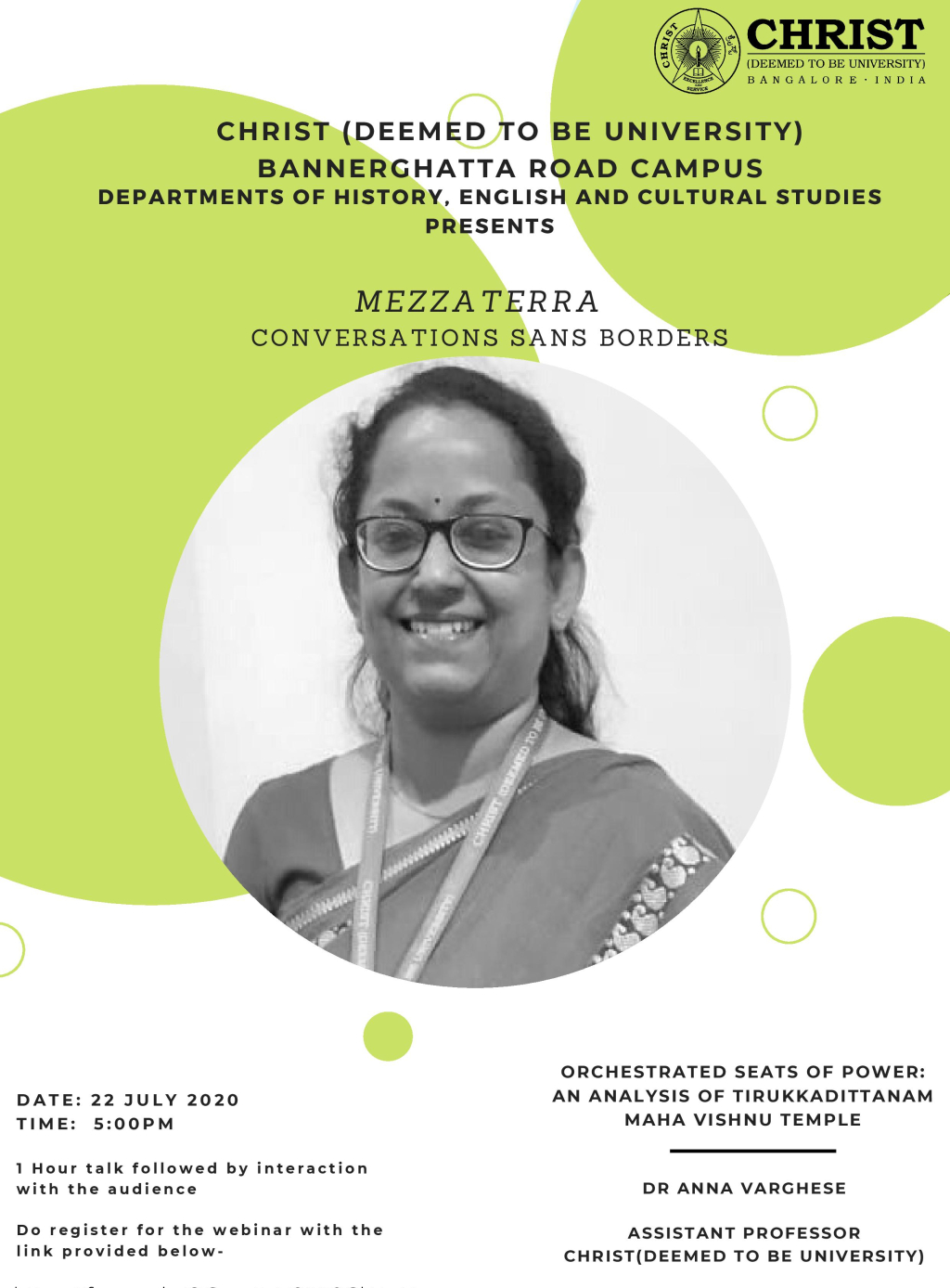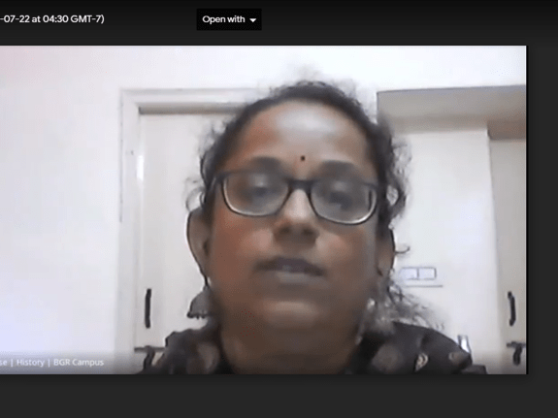

On July 22 ,2020 a webinar was held on “Orchestrated Seats of Power: An Analysis of Tirukkadittanam Maha Vishnu Temple’ as a part of the Mazzaterra webinar series, organised by the Department of English and Cultural studies , CHRIST (Deemed to be )University, Bannerghatta Road Campus.
The resource person was Dr. Anna Varghese , Assistant Professor of History at CHRIST (Deemed to be University), Bannerghatta Road Campus, Bengaluru, India. .The talk began with Dr Arya P V from the department of English and Cultural Studies introducing the speaker, Dr. Anna Varghese, her area of interests and her talk in the context of the webinar series. Dr. Anna talked about the medieval time of Kerala history from 8th c to 16th c during which temples and Brahminical Hinduism flourished, mainly in Southern part of Kerala where Saivsiam and Vaishnavism proliferated and the role of the Hindu kings and their patronage that catered these movements. Kings gave land grants and had a say in the administration and the appointment of temple functionaries. She introduced her topic that specifically focuses on the socio-political and economic seats of power that made a vital role in the establishment of Mahavishnu Temple of Tirukkadittanam, a place in Kottayam district in South Kerala.
The introductory part of her talk covered various sources of information such as the writings of other historians like Rajan Gurukkal, T A Goplakrishna Rao, MGS Narayanan, the various myths and legends about this temple like the popular Panchapandava myth which says that this temple is made by Sahadeva for Lord Krishna who is in his viswarupa image, one of the supreme from of Vishnu, the inscriptional records mainly from 9th, 10th, 11th and 12th c, and the ethnographic data.
She discussed the first inscription that dated 992CE, which talked about a meeting held in the temple where townsmen, council members and managers of the temple met and made some decisions on the expenditure of money for the food offering for the God, the perpetual lamp, the feeding of the Brahmins and the reading of the Mahabharata for which land was granted. They decided that these should not be stopped by anyone and the money from land should not be used for any other purposes. She explained how these things such as the food, the lamp, feeding of Brahmins and the reading of Mahabharata is politically and socially significant in the context of the growth of Bhakti movement and Brahmanism. She highlighted the power disparities in the temple positions by giving the examples of the wage differences of the posts of Santikkaran or the main priest and the posts of the kottikal (drummers) and the shikkol (cleaning people). The priest positions were reserved for the Brahmins and they were paid in terms of gold whereas others paid minimally in kind.
Dr. Anna pointed out that the temple society didn’t function very smoothly as it is clear from the mention of 300 and 600 that referred to the group of people who belonged to a particular chief who is in charge of law and order. In the context of the perpetual lamp that is mentioned in the inscription it is said that the 600 of Keezhumalai and the 300 of Nanrualinadu and Poduvals were responsible for the maintenance of it. There are also records of decisions taken on punishments and penalties given for organized corruption and manipulation of attendance in these inscriptions. She drew attention to the significance of names of persons in the inscriptions as not everybody’s name is mentioned in these records. Careful silencing of large numbers of protests and groups can be observed.
She also discussed the other possibilities of conflicts with another example from the inscriptions. There are records of a person who lost this post of pandarastanam, or the post of the examiner and auditor of temple accounts, which is a very important position. He was evicted from the land he lived and many lands and properties were taken away from him. She suggested that this also points at the possibilities of state intervention in the conflict. Though not very often, the state also interfered in these issues. There were three tiers of power to solve conflicts from the first step of Vazhkai vazhumavar to Governor and then to the King. The rate of the fine increased double each for each ascending tier of authority. She argued that all these things point at the feudatory nature and the economic status of the temple administrative structure at that point of time. These contestations and conflicts in and around the forces of power were not something that was restricted to the temple society because medieval Kerala society didn’t centre within temples as such. Large number of people such as agricultural labourers, artisans etc were outside the structure of temple society.
She argued that King Bhaskara Ravi Varaman had succeeded in legitimizing his power by extending his patronage to the temple as is evident from these inscriptions. This resulted in the possession of power over the ritual, social and economic space of the temple, control on the day to day affairs of the temple, supervision of the temple functionaries and the subsequent marginalization of some of them, and in the establishment of the peculiar ritual practices that helped the growth of a particular society based on Vaishanivism. She concluded her talk by summarizing her observations and arguments.

Participants and Discussions: Apart from CHRIST students, faculty and research scholars from different campuses, a number of academicians and scholars from different universities across Bangalore and India participated in the talk and discussion. Questions were raised on the unrecorded history, superimposition of Brahminic supremacy, and the gender aspect of temple functions. Bhakti movement, pre-recorded history and economic aspects of temple administration were also discussed.
Dharmaram College Post, Hosur Road, Bengaluru - 560029,
Karnataka, India
Tel: +91 804012 9100 / 9600
Fax: 40129000
Email: mail@christuniversity.in
Web: http://www. christuniversity.in
EXCELLENCE AND SERVICE
CHRIST (Deemed to be University) is a nurturing ground for an individual's holistic development to make effective contribution to the society in a dynamic environment.